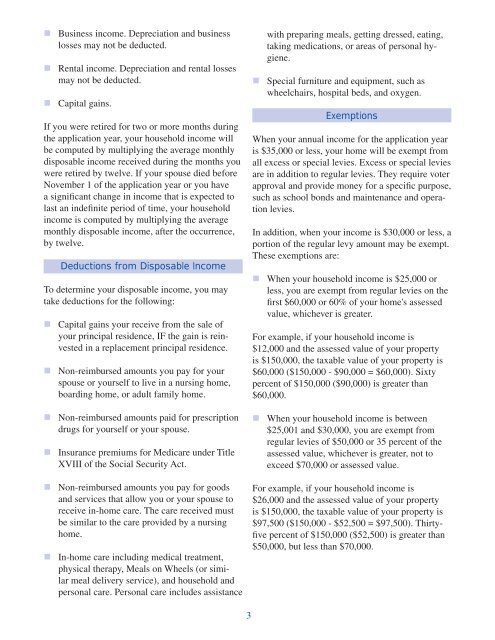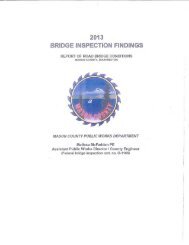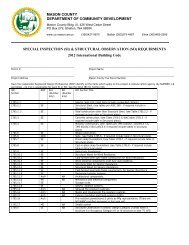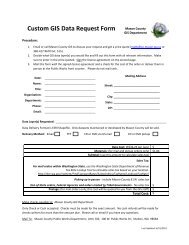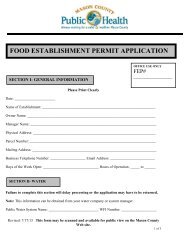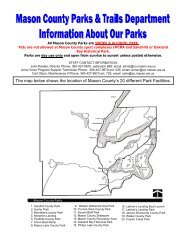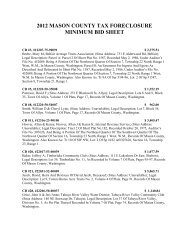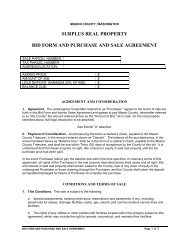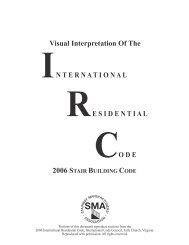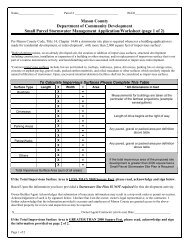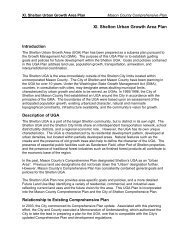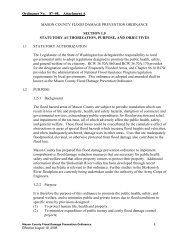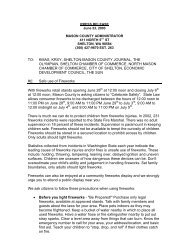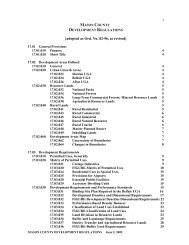Property Tax Exemptions for Senior Citizens and ... - Mason County
Property Tax Exemptions for Senior Citizens and ... - Mason County
Property Tax Exemptions for Senior Citizens and ... - Mason County
Create successful ePaper yourself
Turn your PDF publications into a flip-book with our unique Google optimized e-Paper software.
• Business income. Depreciation <strong>and</strong> business<br />
losses may not be deducted.<br />
• Rental income. Depreciation <strong>and</strong> rental losses<br />
may not be deducted.<br />
• Capital gains.<br />
If you were retired <strong>for</strong> two or more months during<br />
the application year, your household income will<br />
be computed by multiplying the average monthly<br />
disposable income received during the months you<br />
were retired by twelve. If your spouse died be<strong>for</strong>e<br />
November 1 of the application year or you have<br />
a significant change in income that is expected to<br />
last an indefinite period of time, your household<br />
income is computed by multiplying the average<br />
monthly disposable income, after the occurrence,<br />
by twelve.<br />
Deductions from Disposable Income<br />
To determine your disposable income, you may<br />
take deductions <strong>for</strong> the following:<br />
• Capital gains your receive from the sale of<br />
your principal residence, IF the gain is reinvested<br />
in a replacement principal residence.<br />
• Non-reimbursed amounts you pay <strong>for</strong> your<br />
spouse or yourself to live in a nursing home,<br />
boarding home, or adult family home.<br />
• Non-reimbursed amounts paid <strong>for</strong> prescription<br />
drugs <strong>for</strong> yourself or your spouse.<br />
• Insurance premiums <strong>for</strong> Medicare under Title<br />
XVIII of the Social Security Act.<br />
• Non-reimbursed amounts you pay <strong>for</strong> goods<br />
<strong>and</strong> services that allow you or your spouse to<br />
receive in-home care. The care received must<br />
be similar to the care provided by a nursing<br />
home.<br />
• In-home care including medical treatment,<br />
physical therapy, Meals on Wheels (or similar<br />
meal delivery service), <strong>and</strong> household <strong>and</strong><br />
personal care. Personal care includes assistance<br />
with preparing meals, getting dressed, eating,<br />
taking medications, or areas of personal hygiene.<br />
• Special furniture <strong>and</strong> equipment, such as<br />
wheelchairs, hospital beds, <strong>and</strong> oxygen.<br />
<strong>Exemptions</strong><br />
When your annual income <strong>for</strong> the application year<br />
is $35,000 or less, your home will be exempt from<br />
all excess or special levies. Excess or special levies<br />
are in addition to regular levies. They require voter<br />
approval <strong>and</strong> provide money <strong>for</strong> a specific purpose,<br />
such as school bonds <strong>and</strong> maintenance <strong>and</strong> operation<br />
levies.<br />
In addition, when your income is $30,000 or less, a<br />
portion of the regular levy amount may be exempt.<br />
These exemptions are:<br />
• When your household income is $25,000 or<br />
less, you are exempt from regular levies on the<br />
first $60,000 or 60% of your home's assessed<br />
value, whichever is greater.<br />
For example, if your household income is<br />
$12,000 <strong>and</strong> the assessed value of your property<br />
is $150,000, the taxable value of your property is<br />
$60,000 ($150,000 - $90,000 = $60,000). Sixty<br />
percent of $150,000 ($90,000) is greater than<br />
$60,000.<br />
• When your household income is between<br />
$25,001 <strong>and</strong> $30,000, you are exempt from<br />
regular levies of $50,000 or 35 percent of the<br />
assessed value, whichever is greater, not to<br />
exceed $70,000 or assessed value.<br />
For example, if your household income is<br />
$26,000 <strong>and</strong> the assessed value of your property<br />
is $150,000, the taxable value of your property is<br />
$97,500 ($150,000 - $52,500 = $97,500). Thirtyfive<br />
percent of $150,000 ($52,500) is greater than<br />
$50,000, but less than $70,000.<br />
3


